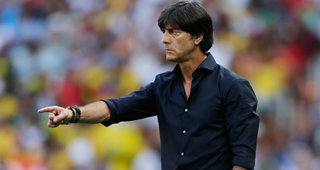“We were left...with just Jerome Boateng and myself in the back” complained Mats Hummels after Germany’s 1-0 shock defeat against Mexico in the opening match of Group F. The most glaring example was in Mexico’s opening goal in which the two 29-year-old German center backs were dragged out of position by Chicharito’s movement on a counter attack finished off by the 22-year-old Chucky Lozano. But it wasn’t a singular instance; Germany’s midfield got passed over on multiple occasions, leaving Mexican attackers in space, with the ball at their feet.
The lack of midfielder cover from Germany’s Sami Khedira, Toni Kroos and Mesut Ozil was a symptom for a larger issue according to Hummels. He could feel a loss against Mexico coming. The center back criticized his teammates for playing in the same lackadaisical manner as they did against Saudi Arabia in their last friendly before the World Cup. But this time, their opponents had the pace and incisiveness to make Germany pay for inattention in transitions.
As Barnay Ronay observed, Germany ended the match with six attackers and three defenders in an uncharacteristic display of desperation from the usually analytical Low. With Kroos targeted by Mexico, Khedira was initially forced into building up play. Eventually, Ozil drifted back to receive the ball deeper in midfield. Marco Reus subbed on for Khedira, adding creativity at the expense of physicality. Mario Gomez replaced left back Marvin Plattenhardt as Germany moved to a three defender backline. Mexico’s defense was unmoved.
Under heavy criticism in the buildup to the World Cup, Mexico manager Juan Carlos Osorio’s tinkering approach broke the flow of Germany’s possession play. In the tactical move of the tournament thus far, Vela manmarked Kroos thereby slowing down Germany’s passing sequences and forcing Khedira on the ball. Osorio subbed Vela off for a holding midfielder in the 57th minute, remarking that they budgeted 60 minutes of energy for the midfielder before the match.
Going defensive for thirty minutes appeared risky, but Osorio implored that he spent six months working on this specific gameplan. Lozano earned the plaudits for his goal, but Vela’s defensive work was vital throughout the match. And that is not to ignore the off ball movement from Chicharito to pull apart Boateng and Hummels, nor the box to box play of Mexico’s midfield three in pressuring Germany in possession, and especially not the defensive line that spent the last 30 minutes clearing German crosses.
Before the tournament, Low admitted that Julian Brandt and Leroy Sane battled for the final attacking spot on the World Cup roster, with the Bayer Leverkusen winger winning out. Low described both players as great one on one players, but felt Brandt provided more balance to his side and that Sane wasn’t yet up to the quality of the national side. Supposed issues in work rate aside, Sane nearly doubled Brandt in successful dribbles per 90 minutes this season in the league. The decision to pass up the Sane’s individual dribbling playmaking for the stability of Brandt may end up being the most significant personnel mistake in Low’s 12-year run as German manager.
After Germany won the World Cup back in 2014, we immediately and blindly placed Germany as tournament favorites in 2018 due to their youth and technical, pacy playing style. That assumption was emboldened by their Confederations Cup victory last summer with many players from their second squad. Perhaps we failed in taking a deeper look and recognizing significant structural gaps as Hummels pointed out. The current viral stat is of how France, Italy and Spain each failed to make it out of the group stage in the World Cup following their title run. Whether it’s only coincidence or not, Low said he had no idea why those defending champions failed to succeed, but guaranteed that the curse wouldn’t hit Germany. On their next match against Sweden this Saturday, he simply said that they had to win.



